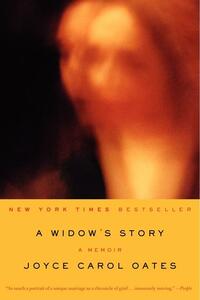You need to sign in or sign up before continuing.
Take a photo of a barcode or cover
A rambling, off-putting read, with way-too-infrequent flashes of honesty. Skip straight to Joan Didion's lucid, excellent The Year of Magical Thinking, or try a different JCO.
I grudgingly finished reading the first chapter of this only because I had to use it for a grad school paper. I refuse to read any more because I can't stand Oates' writing style. Her sentences are so long and convoluted that when you eventually get to the end of a sentence (which might be pages long and filled with dozens of dashes) you've lost track of the point. I might have enjoyed reading the content, but I have no desire to struggle though this.
Un livre sublime, et un témoignage poignant, éprouvant, magnifique, qui m'a retournée. Si je ne peux me mettre à la place de la très grande JCO, je ne peux que compatir, et imaginer sa douleur. Merci, Joyce, pour avoir partagé avec nous votre peine. Bravo pour ce récit de survie, qui m'a fait comprendre que face à la perte d'un être cher, nous sommes tous égaux.
Maybe too heavy a subject for readers who don't have a close experience of loosing someone, but a wonderful reading nonetheless. Started somewhat far from my heart, but Ms. Oates grew very close to me during these pages; the wonderful love shared with her husband for 47 years and 25 days, the pure sentimental description of suicidal thought all so normal in these circumstances, all come together in this heavy grey memoir. It's hard to recommend a book on this subject, but for some times in your life it could be the right reading.
I was kicking myself for choosing this book to read over spring break. What was I thinking? Joyce Carol Oates, National Book Award-winning author, suddenly and unexpectedly loses her husband of more than forty years and she falls apart. This book is a memoir of the months she spent after his death trying to use words, the one thing she has always been able to count on, to find a way to live again.
As a person who has studied happiness for many years, Oates did everything wrong. She secluded herself. She obsessed over her loss. She had thoughts of suicide.
Stop here if you don't want spoilers, but read on if you, like me, are always secretly in search of the happy ending. Oates does come out of her depression. It seems to have happened because of some mysterious combination of her reading of her husband's single, never-completed, never-published novel and Oates' decision to begin to work in her husband's garden. Perhaps the writing of this book helped as well. In any case, I read that Oates has married again. Good for her.
*Thank you to Suzanne at Chick With Books for awarding me this book in her Memoir Monday Giveaway.
As a person who has studied happiness for many years, Oates did everything wrong. She secluded herself. She obsessed over her loss. She had thoughts of suicide.
Stop here if you don't want spoilers, but read on if you, like me, are always secretly in search of the happy ending. Oates does come out of her depression. It seems to have happened because of some mysterious combination of her reading of her husband's single, never-completed, never-published novel and Oates' decision to begin to work in her husband's garden. Perhaps the writing of this book helped as well. In any case, I read that Oates has married again. Good for her.
*Thank you to Suzanne at Chick With Books for awarding me this book in her Memoir Monday Giveaway.
Oates's prose is as usual very clear. And in places very beautiful. But this book is, to put it mildly, REALLY depressing. So gird your loins.
Boy can she write! This eloquently written book brought back all the pain of the hospital vigil and the aftermath of losing my father, my mother and my niece. That may seem strange since it's a book about the death of her husband, but the way she captured the emotional undertow, the insane thoughts and feelings, the sleepless nights and the general malaise of grief is true to any major loss. And did I mention how well she writes? Goodness.
Joyce Carol Oates’s memoir A Widow’s Story is a harrowing, powerful read. I had trouble putting it down, even though it was thoroughly wrenching. I started reading it on my iPhone (my copy courtesy of the publisher) and only after I’d been reading awhile did I figure out that it’s over 400 pages long; it turned out to be a very quick 400 pages, but still, I wondered how she would keep it up for that long. How could she write with such detail, such honesty, such emotion, how could she keep up that level of intensity and make the book readable at that length?
The book tells the story of the death of Oates’s husband, Raymond Smith, in February, 2008. It was a fairly quick final illness and death; he was fine one day, and the next in the hospital suffering from pneumonia. He died a few days later from an infection. Oates tells the story of the days in the hospital and then the days, weeks, and months afterward as she tries to survive and make sense of what happened. She is thoroughly distraught, full of anger and guilt, and she collects sleeping pills in case she decides to commit suicide. The thought of suicide is a comfort, an escape available if she needs it. She has friends who take care of her and help her through all the tasks a widow faces (the funeral, the will, etc.), but she feels only a shell of the person she once was. Her world is an entirely new, unrecognizable, horrible place.
She writes about all this in great detail, describing her thoughts and emotions each step of the way. It should get dull, but it doesn’t: there’s something riveting about her voice that kept me almost spellbound. There is a lot of repetition, which also should get dull, but doesn’t; she faces the same problems again and again — not wanting to be out with people but when she’s home alone not wanting to be there either, getting angry when people say insensitive things, feeling guilty for surviving her husband, thinking about and counting her sleeping pills — and each time it’s a fresh emotional hit, and I felt like I was right there with her.
Read the rest of the review at Of Books and Bicycles
The book tells the story of the death of Oates’s husband, Raymond Smith, in February, 2008. It was a fairly quick final illness and death; he was fine one day, and the next in the hospital suffering from pneumonia. He died a few days later from an infection. Oates tells the story of the days in the hospital and then the days, weeks, and months afterward as she tries to survive and make sense of what happened. She is thoroughly distraught, full of anger and guilt, and she collects sleeping pills in case she decides to commit suicide. The thought of suicide is a comfort, an escape available if she needs it. She has friends who take care of her and help her through all the tasks a widow faces (the funeral, the will, etc.), but she feels only a shell of the person she once was. Her world is an entirely new, unrecognizable, horrible place.
She writes about all this in great detail, describing her thoughts and emotions each step of the way. It should get dull, but it doesn’t: there’s something riveting about her voice that kept me almost spellbound. There is a lot of repetition, which also should get dull, but doesn’t; she faces the same problems again and again — not wanting to be out with people but when she’s home alone not wanting to be there either, getting angry when people say insensitive things, feeling guilty for surviving her husband, thinking about and counting her sleeping pills — and each time it’s a fresh emotional hit, and I felt like I was right there with her.
Read the rest of the review at Of Books and Bicycles





